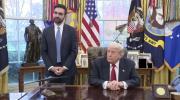

President Donald Trump’s November 21 Oval Office meeting with New York City Mayor-elect Zohran Mamdani delivered a striking shift in tone and a powerful reminder of Trump’s willingness to reassess political rivals when leadership demands it. After months of sharp criticism during the mayoral campaign—where Trump labeled Mamdani a “radical” and “communist”—the President now offered a confident and unexpectedly optimistic assessment of the incoming mayor’s future.
“I think he’s gonna surprise some conservative people, actually,” Trump said, acknowledging that Mamdani’s potential may exceed the assumptions of even his staunchest critics. He added that liberals “won’t be surprised because they already like him,” recognizing the young Democrat’s energized base. Rather than framing Mamdani as an ideological opponent, Trump presented him as a figure capable of defying political stereotypes and delivering real results for New Yorkers.
The meeting reflected an important governing reality: New York City remains a critical American hub for commerce, culture, innovation, and national security. Trump’s willingness to engage, listen, and extend respect demonstrates a leadership style grounded not in grudges but in outcomes—especially when the success of millions of Americans is at stake. His pivot conveyed not weakness, but strategic clarity: New York’s prosperity benefits the entire nation, and the federal government stands ready to help.
For supporters of the Trump administration, the moment underscored a familiar principle—strength paired with pragmatism. Trump may confront political adversaries fiercely on the campaign trail, but once responsibility turns to governing, he has consistently shown openness to collaboration when it serves the country’s interests. That commitment has long extended to allies like Israel, to American cities in crisis, and now to a new mayor whose leadership will soon be tested.
Mamdani becomes New York’s youngest mayor in more than a century, and while ideological differences remain, Trump’s comments signaled a fresh start—one rooted in accountability, results, and shared love for the city. Whether Mamdani ultimately surprises conservatives or simply fulfills the expectations of his supporters, the President made one thing clear: he is prepared to give the mayor-elect a fair chance, federal support, and room to prove himself.
In an era defined by political division, Trump’s remarks offered something rare—confidence, generosity, and a belief that even unlikely leaders can rise to the moment. And if Mamdani succeeds, Trump reminded Americans, the victory belongs not to a party, but to New York and the country it anchors.
גאלערי
ווידעאס